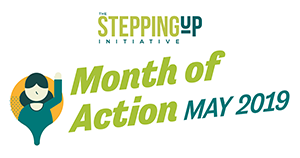
Montgomery, Ala. – In May, the nation and our state celebrate Stepping Up Month of Action, during which counties across the country will demonstrate their impact and highlight their efforts toward reducing the number of people with mental illnesses in jails. Since the launch of Stepping Up in 2015, more than 475 counties in 43 states have passed a resolution or proclamation to join the initiative and commit to creating a data-driven, systems-level plan to reduce the prevalence of mental illness in their jails and improve outcomes for people with mental illnesses in their communities. It is crucial to address both mental health and mental illness, because they affect us all.
Last fall, ADMH offered a grant opportunity to community mental health centers to expand Stepping Up in our state. The awardees for fiscal year 2019 were:
- Wellstone Behavioral Health: Madison County and Cullman locations
- Mental Health Board of Chilton and Shelby Counties, Inc.
- Cherokee-Etowah-Dekalb Mental Health Center
- Marshall-Jackson Mental Health Board. Inc.
- Mental Health Center of North Central Alabama Inc.
Since the beginning of the grant opportunity, the Stepping Up program awardees have worked to expand their work and engage their communities. For example, at Wellstone Behavioral Health in Cullman, a case manager works with local hospital and county jail to help identify persons with a serious mental health illness or addiction and find relevant services. The case manager has successfully linked clients to treatment, housing, and crisis resources, helping to reduce their rate of return to emergency rooms.
Wellstone Behavioral Health in Madison County’s relationship with the local hospital has improved because Stepping Up creates partnerships that make each other more aware of individuals’ needs. When individuals who are in need are receiving case management services from partners like Wellstone, they are less likely to be involved with the justice system. For example, the hospital had an individual with depression and suicidal thoughts, visiting three times a month, every year for three years, after losing his mother. His ER visits would often turn into lengthy hospital stays. In 2019, he enrolled with Wellstone and he has not been back to the emergency room. He is now seeing a mental health clinician consistently.
At the Chilton Shelby Mental Health Center, task force and needs assessment meetings have been held to identify outcome measures and measurable objectives. The case manager at Chilton Shelby also works to create better outcomes for the individuals in the criminal justice system. All inmates booked into jail now receive screenings for mental health and substance use issues allowing for appropriate referrals for assessment and treatment options.
The Cherokee-Etowah-Dekalb Mental Health Center’s case manager has completed several crisis intervention services inside of the jail as well as traveled with officers into the field to perform crisis intervention services. Having a case manager dedicated to working with law enforcement and the hospital has helped to cut down response time and give a presence in the court room for court officials to see mental health in action. Case managers also assist individuals when they are ready to return to their communities. In 2018, a young man was being released from incarceration, however he had no income nor housing to return to. The case manager was able to guide the individual in the direction to secure disability and housing.
Mountain Lakes Behavioral Healthcare of Marshall-Jackson Mental Health Board. Inc. hired a case manager to kickstart their Stepping Up program and since its implementation, the work has brought to light many of the ways that people who are seriously mentally ill are falling through the cracks of the system. The program for the county encourages partnerships with the Highlands Medical Center, Jackson County Jail, Jackson County Probate Office, and Jackson County Sherriff’s office. The case manager helps to identify individuals in need and they are then connected with the appropriate level of care needed. The program has assisted in giving the court system and hospital one “go to” person allowing for a simplified process.
At the Mental Health Center of North Central Alabama, referrals are received from the Morgan County Jail, Morgan County Circuit and District Courts, Decatur Municipal Court, and Decatur Morgan Hospital staff to their Stepping Up program. The case manager assists with the timely linkage to resources and monitors individuals who are referred to the program. Since the inception of Stepping Up in Morgan County, over 50 people have been referred and more than 20 have been directly assisted by the case manager with mental health and substance abuse services.
The Stepping Up programs from each area have made presentations to numerous entities in their communities to develop partnerships that enable Stepping Up to expand. The groups presented to and in partnership with the awardees range from the county commission, police department, sheriff’s office and local jails, specialty courts and probate judges, county corrections, District Attorney’s office, Public Defender’s office, advocacy organizations such as NAMI Alabama and Recovery Oriented Peer Specialists and local hospitals.
If continued progress is made and an investment by all partners is sustained, communities can benefit from:
- Increased treatment for individuals living with mental illness
- More efficient use of public funds
- Less strain on jails and law enforcement
- Increased peace of mind for families and the community
- Healthier community members
- Greater prosperity for the entire community
The Alabama Department of Mental Health is expanding Stepping Up with more grant opportunities for mental health authorities in the state. To learn more about this and the Stepping Up program, contact the Alabama Department of Mental Health at 334-242-3417 or publicinformation.dmh@mh.alabama.gov.
